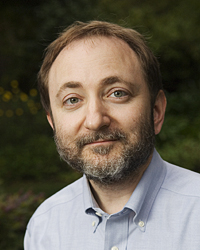Andrew Fire
Andrew Zachary Fire (born April 27, 1959) is an American biologist and geneticist renowned for his co-discovery of RNA interference (RNAi), for which he shared the Nobel Prize in Physiology or Medicine in 2006 with Craig C. Mello. This groundbreaking work, demonstrating the ability of double-stranded RNA to silence genes, has had profound implications for molecular biology, genetics, and biomedical research, paving the way for new approaches to the treatment of various diseases.
Early Life and Education[edit | edit source]
Andrew Fire was born in Palo Alto, California, and showed an early interest in the sciences. He pursued his undergraduate studies at the University of California, Berkeley, where he earned a Bachelor of Arts in Mathematics in 1978. Following his passion for biology, Fire then moved to the Massachusetts Institute of Technology (MIT) for his graduate studies, where he obtained a Ph.D. in Biology in 1983. His doctoral work focused on the mechanisms of gene expression in the nematode Caenorhabditis elegans.
Career and Research[edit | edit source]
After completing his Ph.D., Fire held postdoctoral positions at the Medical Research Council (MRC) Laboratory of Molecular Biology in Cambridge, England, and later at the Carnegie Institution for Science in Washington, D.C. His early research contributed significantly to understanding the genetic organization and expression in C. elegans.
In 1986, Fire joined the faculty of the Johns Hopkins University School of Medicine as an assistant professor. In 2003, he moved to the Stanford University School of Medicine, where he has been a professor of pathology and of genetics.
The most significant breakthrough in Fire's career came from his collaboration with Craig C. Mello. In 1998, they published a landmark paper in the journal Nature that described the process of RNA interference. This process involves the use of double-stranded RNA to silence specific genes, a mechanism that cells use to regulate gene expression and defend against viral infections. This discovery not only provided a powerful tool for scientists to study gene function but also opened up new avenues for therapeutic interventions in diseases caused by genetic anomalies.
Awards and Honors[edit | edit source]
For his contributions to the field of molecular biology, Andrew Fire has received numerous awards and honors, including:
- The Nobel Prize in Physiology or Medicine in 2006, shared with Craig C. Mello, for their discovery of RNA interference.
- Membership in prestigious organizations such as the National Academy of Sciences and the American Academy of Arts and Sciences.
Personal Life[edit | edit source]
Beyond his scientific endeavors, little is publicly known about Fire's personal life, reflecting his preference for maintaining a private life outside of his professional achievements.
Legacy and Impact[edit | edit source]
Andrew Fire's work on RNA interference has had a lasting impact on the field of genetics and molecular biology. It has facilitated the development of new genetic tools for research and has potential applications in the treatment of diseases through gene therapy. His discovery has been pivotal in advancing our understanding of gene regulation and expression, making it one of the most significant scientific achievements in the early 21st century.
Search WikiMD
Ad.Tired of being Overweight? Try W8MD's physician weight loss program.
Semaglutide (Ozempic / Wegovy and Tirzepatide (Mounjaro / Zepbound) available.
Advertise on WikiMD
|
WikiMD's Wellness Encyclopedia |
| Let Food Be Thy Medicine Medicine Thy Food - Hippocrates |
Translate this page: - East Asian
中文,
日本,
한국어,
South Asian
हिन्दी,
தமிழ்,
తెలుగు,
Urdu,
ಕನ್ನಡ,
Southeast Asian
Indonesian,
Vietnamese,
Thai,
မြန်မာဘာသာ,
বাংলা
European
español,
Deutsch,
français,
Greek,
português do Brasil,
polski,
română,
русский,
Nederlands,
norsk,
svenska,
suomi,
Italian
Middle Eastern & African
عربى,
Turkish,
Persian,
Hebrew,
Afrikaans,
isiZulu,
Kiswahili,
Other
Bulgarian,
Hungarian,
Czech,
Swedish,
മലയാളം,
मराठी,
ਪੰਜਾਬੀ,
ગુજરાતી,
Portuguese,
Ukrainian
Medical Disclaimer: WikiMD is not a substitute for professional medical advice. The information on WikiMD is provided as an information resource only, may be incorrect, outdated or misleading, and is not to be used or relied on for any diagnostic or treatment purposes. Please consult your health care provider before making any healthcare decisions or for guidance about a specific medical condition. WikiMD expressly disclaims responsibility, and shall have no liability, for any damages, loss, injury, or liability whatsoever suffered as a result of your reliance on the information contained in this site. By visiting this site you agree to the foregoing terms and conditions, which may from time to time be changed or supplemented by WikiMD. If you do not agree to the foregoing terms and conditions, you should not enter or use this site. See full disclaimer.
Credits:Most images are courtesy of Wikimedia commons, and templates, categories Wikipedia, licensed under CC BY SA or similar.
Contributors: Prab R. Tumpati, MD

